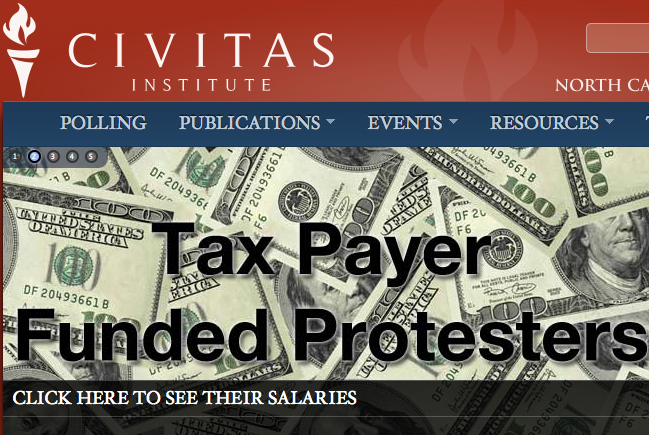NC protester database now disclosing public employee salaries

The conservative group that launched a website last week publicizing details about people who've been arrested during the ongoing Moral Monday protests at the North Carolina legislature has expanded the database to include salaries of arrestees who are public employees.
But the Civitas Institute's project also experienced a setback when local officials announced they would no longer collect mugshots of those arrested for nonviolent civil disobedience at the weekly protests. The arrestees have been charged with misdemeanors including trespassing and failure to disperse.
Civitas announced the expansion to include public worker salaries in the newsletter it sent out this week.
"As more people have gotten arrested at the protests," Civitas said, "we've continued our analysis of what they are up to -- including the salaries of those protesters on the public payroll."
In a promotion for the database on the front page of its website, the group refers to "Tax Payer Funded Protesters."
Civitas was founded and is funded primarily by GOP mega-donor and North Carolina budget director Art Pope, CEO of the Variety Wholesalers discount retail chain. It also gets support from the Charles Koch Foundation, a charitable fund associated with one of the billionaires and conservative philanthropists behind the Koch Industries oil and chemical conglomerate.
So far, Civitas has publicized salary information for 29 arrestees. They range from an N.C. Department of Transportation worker earning $29,000 a year to a University of North Carolina professor earning $240,000. Public employees represent 29 of the 457 arrestees Civitas currently has in its database. So far, over 600 people have been arrested in the protests.
This week, another 120 people were arrested inside the legislative building at the eighth Moral Monday action. It was the largest one yet, with some estimates putting the number of attendees at 3,000. The protests are targeting a Republican agenda that has included cutting unemployment benefits, rejecting health care expansion, and slashing education spending.
Meanwhile, Civitas is objecting to a decision by the local City-County Bureau of Identification to stop collecting mugshots and fingerprints of those arrested at the protests in order to cut costs. The group used the mugshots for a "Pick the Protester Game" on its website. As the group's president, Francis De Luca, told WRAL News:
"Now, they're being processed through the clerk of court, which is basically filling out a form and then being released. They get a court date and aren't getting fingerprinted or mug shots. … I kind of equate it to fishing. It's like catch and release. You catch a fish and throw it back into the water."
Wake County District Attorney Colon Willoughby (D) said he initially proposed citing Moral Monday protesters instead of arresting them. However, General Assembly Police Chief Jeff Weaver rejected the idea, saying it would be ineffective at removing protesters from the premises. The first arrestees appeared in court this week but the cases were delayed.
The creation of the arrestee database by Civitas has led to comparisons to strategies used by groups opposed to the mid-20th century civil rights movement, which included publishing the names of NAACP supporters in newspapers to encourage retaliation.
For example, Mark Sigmon -- an attorney who once worked with Civitas on a lawsuit -- wrote a letter to the editor of The News & Observer about his Moral Monday arrest in which he called the group's database a "blacklist" and criticized its motives:
You know, so neighbors and employers can "be informed" and "discuss things" with the troublemakers. (Does this ring a bell for anyone around in the 1950s and 1960s?)
Rev. William Barber of the North Carolina chapter of the NAACP, which is organizing the protests, said Civitas was "trying to play a trick" by drawing media attention away from the issues that matter.
Meanwhile, a private effort to compile public data about citizens protesting their state government is at the center of a political uproar in another state.
Following the 2011 effort to recall Wisconsin Gov. Scott Walker (R), the tea party groups We the People of the Republic and Wisconsin Grandsons of Liberty launched a searchable website called Verify the Recall with help from True the Vote, a tea party group based in Houston that focuses on voter fraud. That website collects information about Wisconsinites who signed the recall petition and encourages visitors to "investigate your own 'corner of the world!'"
Controversy erupted earlier this month when Walker suspended his nomination of a University of Wisconsin student to serve on the school's Board of Regents after a database search revealed that the student had signed the recall petition.
Tags
Sue Sturgis
Sue is the former editorial director of Facing South and the Institute for Southern Studies.
